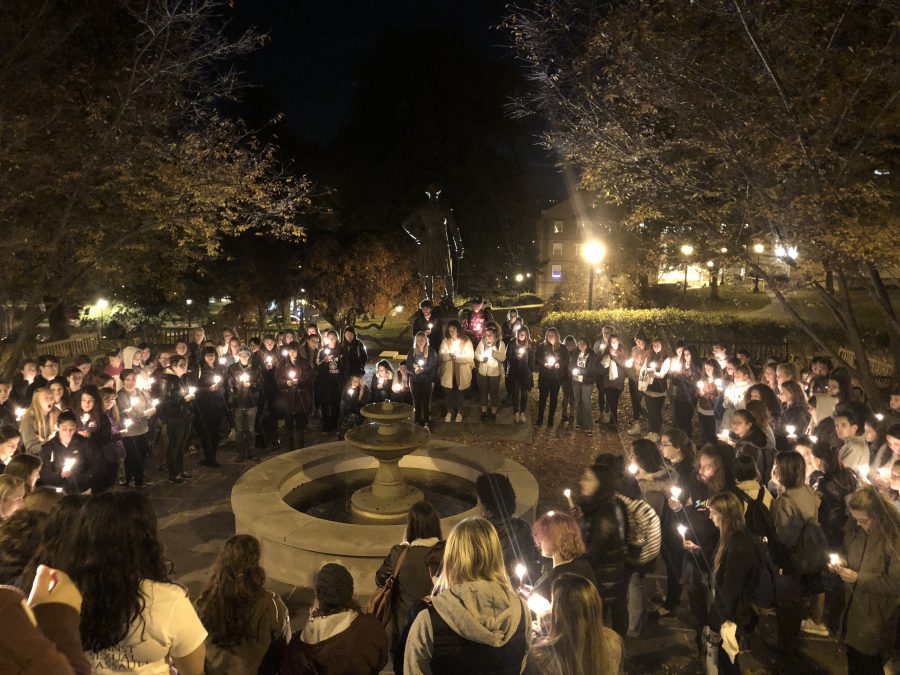Addressing head-on what lies beneath the surface of the college community, Pards Against Sexual Assault (PASA) made Lafayette’s toxic culture surrounding sexual assault a main topic of discussion at Thursday’s Take Back the Night. They posed a direct question to the audience of students at the keynote event: how can you be a part of the solution to make Lafayette a place that doesn’t silence survivors, but validates and empowers them?
This year, PASA centered their event entirely on Lafayette, with no outside speaker invited to their second annual keynote and vigil. The night was preceded by a week of events that included a film night, clothesline project and 5k.
To kick the keynote off, the lights went down in Colton Chapel while student voiceovers told their stories of surviving sexual assault. They also read statistics about sexual assault on our campus and excerpts of past articles on the topic by The Lafayette—all to set the stage on where the college currently stands.
Following the voiceovers, members of PASA stood facing the near-full crowd and spanning the forefront of Colton Chapel. They read their pledge to be a Pard Against Sexual Assault, and asked the audience to take the same pledge, which included being an advocate for survivors, an ally to them and an active part of the solution, while staying informed and being compassionate.
Reeve Lanigan ’19 and Nina Cotto ’19, co-founders of PASA, then spoke directly to the audience. They read out statistics that, they noted, a lot of people had already heard—one in five women will be sexually assaulted, one in 16 men.
Cotto then posed a stirring question to the audience: do you know what it’s actually like to be one of those statistics, as 350 Lafayette students do?
Lanigan emphasized that a community like Lafayette’s should be there for one another not just through the successes we experience, but the trauma as well. While PASA appreciates their co-sponsors and attendees, they said it’s not the end of the work that needs to be done—it’s the start.
The vigil that followed the event was the start of healing for some community members. Chaplain Alex Hendrickson invited anyone who felt comfortable to come forward and share their story to the vigil crowd of community members, who were gathered around the fountain of Colton Chapel, each holding a candle.
The intensity and sacredness of the vigil was not unlike last year’s. Speakers shed tears while conveying their stories, and some were even moved to sobbing by the stories of others. Stories were told of incidents at the college and incidents outside it. Almost all were victimized by people they knew.
A central theme was apparent: there’s more pride in being a survivor than there is shame. Even if you can’t label what happened to you, speakers said, the trauma you experience is still valid.
Survivors who spoke at the vigil made clear why Lafayette needs a culture change to boost community support for survivors and to urge bystanders to act. Ways to combat the toxic culture were presented during the the keynote, not just by an individual speaker, but by members of the community.
Assistant Director of Admissions Cristina Usino, who’s worked closely with PASA in the past as the former Gender and Sexuality Coordinator, spoke after Lanigan and Cotto. Referencing the college’s newly launched One Pard reporting system, she emphasized how much one student, or “pard,” can make a difference—because she has seen it herself.
Sam Arnold ’18, Lanigan, Cotto and Nahin Ferdousi ’19, all co-founders of PASA, were individual students who started a wave of impact, according to Usino. As a programmer herself, she struggled to get even 12 students to attend meetings to discuss issues like sexual misconduct—two years in a row now, PASA has been able to fill Colton Chapel for TBTN.
Usino turned the mic on the crowd that PASA was able to draw, urging students to speak up about how they can be a part of what ends the toxic culture at Lafayette.
Kira Botelho ’20 said that there must be a separation of violent rhetoric and the dialect we use to talk about sex. The Lafayette received an op-ed criticizing this same issue last March. Elle Cox ’21 wrote that words like “kill” and “smash” when discussing hook-ups are all too prevalent in our community.
One audience member said that people should alert their friends or even strangers when they see someone else with a known predator. Others suggested declaring oneself as a resource for friends to turn to in times of stress and not discrediting one’s own experience as a survivor.
Charles Evans ’19 said he felt the urge to speak during the keynote, since a lot of men were there, but he wanted to voice “the responsibility [men] [have] to recognize our privilege.”
“Especially for men as [beneficiaries] of the patriarchy, a lot of times we try to swoop in and save the day,” Evans said, “but at the end of the day, we’re taking the attention away.” Last year, keynote speaker of TBTN Gordon Braxton urged men to take responsibility, and to start conversations about consent with their partners.
Although the bare minimum is showing up to TBTN, Usino said, it is something powerful.
“That bare minimum is exactly where we need to start,” Usino said. “That bare minimum is powerful because it is the beginning of the journey…of being an active witness.”
The Rape, Abuse and Incest National Network (RAINN) states on their website that “[a]mong undergraduate students, 23.1% of females and 5.4% of males experience rape or sexual assault through physical force, violence, or incapacitation.”
Three rapes and three sexual assaults have been reported to the college so far this year.




































































































